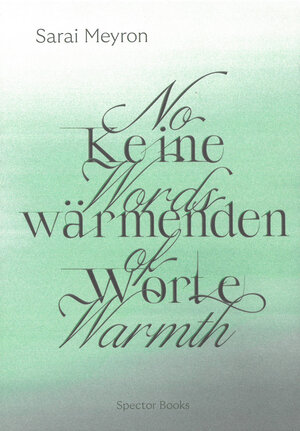No Words of Warmth / Keine wärmenden Worte
von Sarai Meyron, übersetzt von Issy Schriber und Carina GerkeNo Words of Warmth / Keine wärmenden Worte ist ein hybrides Künstlerbuch, das in Text, Bild und Ton Einblick in das Leben einer jungen jüdischen Künstlerin in Deutschland gewährt. Assoziationen von Schwester, Tochter, Mutter und Großmutter werden durch die Augen der Protagonistin zu einer feministischen Stimme verwoben, die sich mit der Vergangenheit und deren Fortwirken in der Gegenwart auseinandersetzt. Realität und Fantasie verschwimmen in einen Bewusstseinsstrom, der so wahrhaftig ist wie die Erinnerung oder die erinnerte Geschichte. In dem Buch wird eine neue Generation sichtbar, die sich bewusst für das Leben in Deutschland entschieden hat und sich weder durch die Religion noch durch den Zionismus definiert, sondern als kulturell jüdisch – und die vereint ist im Aufgebehren gegen den Antisemitismus und in der kritischen Selbstreflexion.
Sarai Meyron, geb. 1995 in Jerusalem, lebt und arbeitet in Braunschweig.
––
No Words of Warmth / Keine wärmende Worte is a multifaceted and hybrid art book—combining text, sound, and images—that provides a glimpse of a young Jewish woman’s life as an artist in Germany. Associations relating to the roles of sister, daughter, mother, and grandmother are woven together through the eyes of the protagonist to create a cohesive feminist voice that explores the past and its influence on the present. Reality blurs with fantasy in a form of stream-of-consciousness writing that is as true as memory or remembered history. Energized by a process of critical selfreflection, this book can be seen as a stand against dehumanization, and a reflection of Jewish life in Germany today.
Sarai Meyron, b. 1995 in Jerusalem, lives and works in Braunschweig.
Sarai Meyron, geb. 1995 in Jerusalem, lebt und arbeitet in Braunschweig.
––
No Words of Warmth / Keine wärmende Worte is a multifaceted and hybrid art book—combining text, sound, and images—that provides a glimpse of a young Jewish woman’s life as an artist in Germany. Associations relating to the roles of sister, daughter, mother, and grandmother are woven together through the eyes of the protagonist to create a cohesive feminist voice that explores the past and its influence on the present. Reality blurs with fantasy in a form of stream-of-consciousness writing that is as true as memory or remembered history. Energized by a process of critical selfreflection, this book can be seen as a stand against dehumanization, and a reflection of Jewish life in Germany today.
Sarai Meyron, b. 1995 in Jerusalem, lives and works in Braunschweig.






